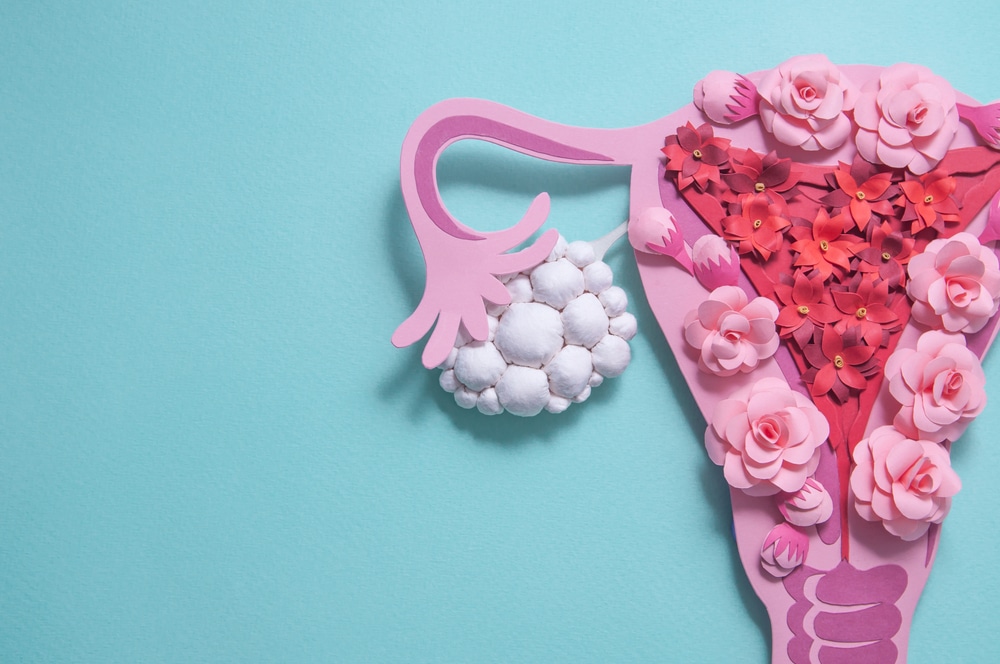Although hormonal imbalances are common, many still struggle with their profound effects. Estrogen fluctuation in the body affects one of the most talked about topics, which is weight. Does low estrogen cause weight gain? Here is everything you need to know about the link between low estrogen and weight gain!
What Is Estrogen?
It is a hormone that is responsible for various body functions. Contrary to what most people think, it is found in both men and women. However, in men it is present in small amounts only (3).
In women, most people know this hormone as their primary sex hormone. Besides this it also has other roles in the female body. For example, it helps develop and maintain the reproductive system and female features like the breast and pubic hair (3).
In men, this hormone is used in the production of sperm (3). However, too much of it may cause infertility, erectile dysfunction or cause men to have bigger breasts than usual (3). Estrogen is also involved in cognitive health, the cardiovascular system, and bone health (3).
Levels Of Estrogen
Estrogen levels naturally vary depending on several factors. The fluctuation of this hormone has various effects, for example, mood changes and hot flashes during menopause (3). These factors include (3):
- Pregnancy, the end of pregnancy, and breastfeeding
- Menopause
- Puberty
- Obesity and overweight
- Anorexia nervosa or extreme dieting
- Strenuous training
- Using various medications like steroids, estrogen-containing drugs, ampicillin, phenothiazines, and tetracyclines
- High blood pressure
- Congenital conditions like Turner’s syndrome
- Primary ovarian insufficiency
- Polycystic ovary syndrome (PCOS)
- An under-performing pituitary gland
- Tumors of the adrenal glands and ovaries
Read More: High Estrogen Foods: 12 Natural Sources Of Phytoestrogens

Estrogen Imbalance
Any hormonal imbalance in the body can have several effects. For example, an imbalance of estrogen in your body may cause the following (3).
- No or irregular menstruation
- Noncancerous lumps in the uterus and breasts
- Hot flashes and night sweats
- Mood changes and poor sleeping patterns
- Weight gain, mainly in the thighs, waist, and hips
- Severe premenstrual and menopausal symptoms
- Light or heavy bleeding during menstruation
- Fatigue
- Dry skin
- Low sex drive
- Vaginal dryness and atrophy
- Depressive and anxious feelings
Low Estrogen
Several effects are associated with low estrogen in the body. Before we look into these effects, let us first look into what affects estrogen. Estrogen levels may drop because of the following reasons (6):
- Age. Age is the most common culprit of low estrogen levels. As women age, the levels of this hormone drop, which is normal because they are approaching menopause (6).
- Health Conditions. Low estrogen levels may also occur because of health conditions, particularly those affecting or damaging your ovaries. Some examples of these health conditions include premature ovarian failure.
- Congenital Conditions. Congenital conditions like Turner’s syndrome also affect your estrogen levels and make them drop significantly.
- Thyroid Disorders. These refer to conditions that affect the thyroid glands.
- Extreme Exercise. Be warned; intense training does not only increase your injury risk but may also cause your estrogen levels to drop.
- Being Severely Underweight.
- A Low-Functioning Pituitary Gland. The pituitary gland is responsible for many roles, such as controlling metabolism, growth, blood pressure, and sexual maturation.
- Chemotherapy. Unfortunately, chemo is also linked to low estrogen levels and its effects.
Whether you’re looking to simply pep up your fitness routine, jazz up your diet with mouth-watering low-calorie recipes or want to get your act together and significantly drop that number on your scale – BetterMe app has got you covered! Improve your body and revamp your life with us!

Low Estrogen Symptoms
Estrogen is a vital hormone in the body, so you need to watch out for its symptoms to avoid estrogen imbalance. Some of the signs of low estrogen to look out for include (6):
- Irregular Menstrual Cycles. Irregular flows are one of the telling signs of low estrogen in women. Since estrogen is the hormone responsible for driving menstruation, low levels can lead to an irregular or missed period.
- Weak Bones. One of the roles of this hormone in your body is maintaining healthy and strong bones. So, when there is a low concentration of the hormone, bone loss occurs. As a result, you experience a high risk of osteoporosis, especially in post-menopausal women.
- Infertility. The other sign of a low concentration of estrogen in your body is infertility. Low estrogen concentration in your body prevents ovulation, making getting pregnant difficult and eventually leading to infertility.
- Hot Flashes. Most women in the menopause phase experience hot flashes. Low estrogen levels cause them.
- Painful Intercourse. Low levels of estrogen also affect vaginal lubrication. It causes vaginal dryness, which leads to painful sex. Do not settle for an intervention to correct this without talking to your doctor.
- Depression. Although most people may not know this, low estrogen levels are also linked to depression. According to Medical News Today, low estrogen levels affect serotonin levels. Serotonin is a chemical in the brain that boosts an individual’s mood (6). When you are experiencing an estrogen deficiency, serotonin levels drop, leading to mood swings and depression (6).
- Increased Urinary Tract Infections (UTIs). These may occur because low levels of this hormone cause thinning of the urethra tissues.
These are the significant symptoms experts suggest you look out to know if you have estrogen deficiency. However, you may experience some symptoms but end up being diagnosed with another medical condition instead of this deficiency, because they can have other causes as well. So, the only way you can be sure you have estrogen deficiency is by getting a test.
Read More: Low Estrogen Diet: Balance Your Hormones Through Your Meal Plan

Estrogen Tests
An estrogen test measures the levels of this hormone in your blood or urine. You can measure this by taking a home test that requires you to test in your saliva (2).
If you’d rather not take the home test, you can go to your doctor for the test. However, note that there are different estrogen tests conducted because there are different types of estrogen. The three commonly tested types of estrogen are (2):
- Estrone (E1). This is the primary female hormone that is produced in women after menopause (2). Menopause usually starts around the time you turn 50.
- Estradiol (E2). This is the primary female hormone made by non-pregnant women (2).
- Estriol (E3). This hormone is produced in high quantities during pregnancy (2).
An individual mainly conducts an estradiol and estrone test when they want to (2):
- Diagnose menstrual problems.
- Learn the reason behind early or late puberty in girls and the reason for late puberty in boys.
- Monitor various infertility treatments.
- Find tumors that produce estrogen.
- Monitor menopause treatments.
- Discover the cause of infertility in women.
An estriol hormone test, on the other hand, is conducted when an individual wants to (2):
- Monitor a high-risk pregnancy.
- Diagnose specific congenital disabilities during pregnancy.
There is nothing special you need to do before preparing for an estrogen test. All you have to know is the reason you are conducting this test. As seen from above, there are different types of estrogen tests and all test different things
So, talk to your doctor about the specific reason you want to conduct an estrogen test. They will know the test to give you, based on your response. There is little to no risk with having a blood estrogen test (2).
According to MedlinePlus, after such a test, all that usually happens is a slight pain or bruising where you were injected (2). In addition, experts have not found any significant risk with conducting either a urine or saliva test (2).
If you struggle to even flirt with the idea of giving up your favorite foods or working out till your legs give way – BetterMe app is here to breathe a fresh perspective into the way you view the weight loss process! Check out the app and experience the fun side of fitness and dieting with BetterMe!

Does Low Estrogen Cause Weight Gain?
Most hormones, including estrogen, can have a profound impact on weight. According to Medical News Today, lower estrogen levels in the body, mainly during menopause and perimenopause, often cause sudden weight gain (2).
Sadly, the weight is not distributed evenly throughout your body. Instead, most of it tends to settle in your waits, hips, and thighs. This is because weight gain during menopause primarily settles in your hips and thighs (2).
That said, as time goes on and estrogen levels continue to drop, fat settles more in your abdominal area (1). The type of fat that settles in your abdominal area is known as visceral fat and is considered dangerous. It is linked to conditions like stroke, heart disease, diabetes, and some cancers (1).
Weight gain in older women with low estrogen levels can be more profound due to other factors. For example, loss of muscle mass due to aging increases weight gain, which, coupled with low estrogen levels, can add significant weight (1).
Nevertheless, experts acknowledge that weight gain during menopause and reduced estrogen levels are normal. Despite this acknowledgement, the unexpected weight does sit well with most women.

How To Not Gain Weight?
Luckily, you do not have to worry about it because experts have developed helpful ways of keeping the unwanted weight at bay. Here are simple interventions to help you lose weight or maintain an ideal weight, even when your estrogen levels are fluctuating (2):
-
Eating A Healthy Diet
The most recommended technique is consuming a healthy and balanced diet. You have to ditch unhealthy foods like junk, sugary, and highly processed foods (5). Instead, you are advised to consume more fruits, vegetables, legumes, whole grains, healthy fats, and low-dairy products.
Talk to your doctor and nutritionist if you are trying to lose weight using a diet plan. You may need professional help crafting a weight loss diet plan that meets your dietary and calorie requirements.

-
Exercising
Performing physical activity will also help you lose weight associated with low estrogen levels. There are so many exercise programs to choose from. They include aerobic or cardio workouts, yoga, stretching, and strength training programs.
It would be best if you talked to your doctor and fitness trainer before starting any exercise program. Remember that each program has its pros and cons, which you must go through with a professional. Again, different programs best fit different fitness goals.
For example, stretching exercises are more suitable for improving flexibility and fighting muscle stiffness. Likewise, you need to know various things about the activity you have chosen, for example, proper form and how long and often you should work out.
For instance, if it is a strength training activity, Mayo Clinic suggests performing the program at least twice a week (5). It’s also recommended to include at least 150 minutes per week of moderate intensity aerobic activity.
These are some of the many factors you need to go through with these professionals. So, make sure you schedule an appointment with them.
-
Limiting Alcohol Consumption
Alcoholic beverages contain a high amount of calories, which may lead to a calorie surplus on any given day. A calorie surplus increases the risk of weight gain instead of weight loss (4). So, opt for other beverages, mainly those with a lower count of calories like water. Water has zero calories and is the number one recommended drink for weight loss.

-
Eating All Meals
Many weight watchers have a habit of skipping breakfast. Despite the saying that breakfast is the most important meal of the day, most dieters choose to go without it. The debate of whether skipping meals is healthy or not has been a topic of discussion for the longest time now.
According to Medical News Today, studies do not advocate skipping breakfast but rather recommend eating it every day. Having a protein-rich breakfast increases satiety and prevents overeating throughout the day that is linked to a calorie surplus (4).
Select a high-protein breakfast that includes eggs, quinoa porridge, chia seed pudding, or sardines (4). Then, ask your nutritionist to craft you a meal plan to avoid consuming the same thing over and over.

-
Intermittent Fasting
Another way of shedding pounds is intermittent fasting. This refers to an eating pattern involving regular short-term fasts and then shorter durations to eat, mainly during the day (4). There are several types of intermittent fasting, some of which include (4):
- Alternate Day Fasting (ADF). In this method, you fast one day and eat normally for the alternating day, and continue with this pattern for the entire week. There is a modified version that requires one to consume 25% to 30% of their body’s energy needs during the fasting days (4).
- The 16/8 Method. This fasting method requires you to fast for 16 hours each day and then have your meals during an 8-hour window. This window tends to range between noon and 8 p.m. for many people, but can be adjusted according to your schedule (4). According to Medical News Today, this restricted eating window may help individuals consume fewer calories, which is effective for weight loss (4).
- The 5:2 Method. You are required to fast on two nonconsecutive days and eat normally for the other 5 days of the week. During the fasting days, make sure you limit your calorie intake to between 500 and 800 calories (4).
Deciding on the intermittent fasting method to choose from can be daunting, especially for beginners. So, to help you make a well-informed decision, you are asked to talk to your doctor.
-
Getting Enough Sleep
Studies reveal that poor sleep quality and a lack of enough sleep slows down metabolism (4). Metabolism is the process in which your body breaks down food or converts calories to energy (4). When it slows down, your body stores more unused energy as fat (4).
Additionally, when you do not get enough sleep, your body releases a hormone called cortisol (4). This prompts storage of fat when it is produced in large quantities in various ways.
The most common way is by affecting the hormones leptin and ghrelin that are responsible for appetite regulation (4). So, make sure you get enough and quality rest.
-
Managing Your Stress Levels
Stress also contributes to weight gain by triggering the release of adrenaline and cortisol (4). Initially, they make your appetite decrease as your body’s first flight response (4). However, with prolonged stress, cortisol remains in your bloodstream and increases your appetite, leading to overeating. This means extra calories.
Experts have discovered several stress-management interventions to help reduce stress-related weight gain. These include yoga, mindful meditation, deep breathing techniques, tai chi, brisk walks, or leisure activities (4).
How To Deal With Low Estrogen Levels
After your doctor discovers you have low estrogen levels, they may propose various things to help restore balance. Some of these include:
-
Taking Supplements Or Medications
Your doctor may feel the need to put you on supplements and medications to help correct this imbalance. Stick to the provided dosage and do not stop the medication without consulting with your doctor.
-
Estrogen Therapy
This form of therapy helps manage menopausal symptoms as part of hormone therapy. Most people refer to this as hormone replacement therapy (3). This treatment constitutes mainly estrogen or a combination of estrogen and progestin, a synthetic form of progesterone (3).
The Bottom Line
Does low estrogen cause weight gain? Yes, it can. A drop in the estrogen levels in your body often causes unwanted weight gain, especially in your abdominal area, hips, and thighs. Talk to your doctor if you believe estrogen deficiency is responsible for your weight gain. They will conduct a test and recommend a suitable intervention.
DISCLAIMER:
This article is intended for general informational purposes only and does not address individual circumstances. It is not a substitute for professional advice or help and should not be relied on for decision-making. Any action you take upon the information presented in this article is strictly at your own risk and responsibility!
SOURCES:
- Can estrogen levels affect weight gain (2018, medicalnewstoday.com)
- Estrogen Levels Test (2021, medlineplus.gov)
- Everything you need to know about estrogen (2020, medicalnewstoday.com)
- How to naturally lose weight fast (2018, medicalnewstoday.com)
- Menopause weight gain: Stop the middle age spread (2021, mayoclinic.org)
- What happens when estrogen levels are low? (2018, medicalnewstoday.com)












